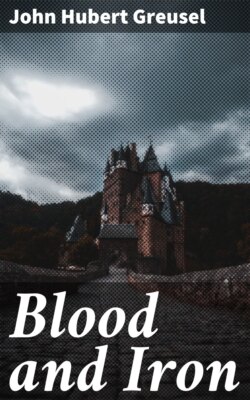Читать книгу Blood and Iron - John Hubert Greusel - Страница 14
На сайте Литреса книга снята с продажи.
7
ОглавлениеBoisterous Col. Bismarck, of the Dragoons; “The Wooden Donkey dies today!” French Cavalier Bismarck and his mushy prose-poems.
¶ Burly strength and horse-play, rather than diplomacy, were always distinctive traits of that part of the Bismarck family immediately surrounding Otto von Bismarck; and in Otto’s case, although the years gradually taught him that there are more ways of stopping a man’s mouth than by cutting off his head, on the whole we seek in vain, among ancestral Bismarcks, for any striking characteristics in which the point does not turn either on gluttony or on deep-drinking.
¶ They were enormous eaters. Bread and meat were not enough. They must have game, fish, cake, wines, and plenty of each. Hunger put them in a rage. They were iron men, with stomachs of pigs.
¶ They were unbrooked master spirits, followed the hounds, fought duels, had noisy tongues, and gloried in personal independence.
When they loved they loved madly; when they hated it was the same. They drank all night and were out again at dawn.
¶ Yet in their way, they were high-minded gentlemen, devoted themselves industriously to their duties; and it may be that the turbulence of their lives borrowed something from the rude clash of opinion that often divided the best friends, during the stormy periods of history in which they fought as soldiers of fortune.
¶ Otto von Bismarck’s great-grandfather, Augustus, calling his cronies of the barracks around him, was wont to add zest to the carousal by introducing the trumpet call after each toast; to heighten the infernal racket, the boisterous colonel of dragoons ordered a volley fired in the drink-hall.
¶ This terrible dragoon, master of the hounds, guzzler, companion and leader in all revels, was generally voted one of the amiable men in army circles. He was a noted shot. In one year of record his score was 154 red deer and 100 stag.
¶ At the Ihna bridge was a ducking stool, for army punishments; it took the amusing style of a wooden donkey, and was so called by the dragoons as a rude joke.
After one of his hard drinking bouts, it was often the colonel’s amusing habit to order his men to march to the bridge; on arriving the band struck up and the wooden donkey was thrown into the stream. “All offenders of my regiment are forgiven,” Bismarck would bawl, “the donkey dies today!”
Then with all manner of opera bouffe the offending donkey would be put overboard—only to be brought out next morning, ready for official business.
¶ But our fun-loving colonel’s good times were now over. As commander of the gallant Anspach-Bayreuth dragoons, Augustus fought for Frederick the Great and was severely wounded at Czaslau. Austrian hussars surprised the transport wagons carrying the wounded to the rear, and with brutality common to the soldier-business of that rude day killed the defenseless Prussians, among whom was our Colonel von Bismarck.
¶ Bismarck’s grandfather, Karl Alexander, leaned toward the namby-pamby intellectual rather than to the social and convivial. He is remembered for his affected poetical style. Karl, brave soldier, attracted the eye of no less a judge of valor than the Great Frederick, who appointed this Karl Alexander von Bismarck an attache of the Prussian embassy at Vienna.
¶ Karl, like other Germans of the sentimental period, aped the French poets; but when a German is sentimental, the mush-pots boil over. Karl’s writings show that peculiar over-inflated quality, “sentimentality,” so much admired in the rococo period.
¶ Karl William Ferd., Otto’s father, and Louise Wilhelmina, Otto’s mother, born Mencken, lived at Schoenhausen in troublous French times. Oct. 14th, 1806, the terrible defeat at Jena put Prussia in the hands of the enemy.
Fortresses surrendered without firing a shot, and the panic-stricken king fled to the far eastern side of his domains, near Russia.
All this took place within three months after the marriage of Karl and Louise, who had now set up housekeeping at Schoenhausen.
¶ The Bismarcks tried to escape in a coach, but the French unexpectedly appeared and ordered Karl back to the house. The French ransacked every room; Louise fled to the library and locked the massive oak door; to this day it bears the marks of French bayonets; the Bismarcks then hid in the forest where they remained all night with panic-stricken neighbors; at dawn Karl and Louise ventured out, to find Schoenhausen a scene of destruction.
¶ The one galling fact that Karl could not overlook, in Marshal Soult’s raid, was the desecration of the genealogical tree. This huge painting with its shields of the Bismarck descent was slashed from end to end, with bayonets!
¶ Oh, Otto von Bismarck remembered this many, many years later, in making terms with the French after Sedan—do not for a moment forget that! Such is the amazing power of hereditary loves and hates;—and certainly the Bismarcks had no reason to admire the French.
